Galaxy Trucker — A Game for the Ages
Review updated on March 14th, 2022- adding in thoughts about newest version of Galaxy Trucker.![]()
When it comes to legendary board game designers, few are more renowned than Vlaada Chvatil. Among his many accolades, Vlaada held BoardGameGeek’s number one rated game (Through The Ages) for several years, even appearing in our own Top 50 Board Games Ever. Whilst Through the Ages is a very heavy, thought provoking game, Vlaada is apparently quite the comedian in the flesh, and I wonder if that’s what led to the popularity of another of his games; the iconic and almost entirely unique Galaxy Trucker.
Galaxy Trucker was first released by Czech Games Edition (CGE) in 2007, which, in board gaming terms, makes it as old as a dinosaur. As I often write in my reviews, the gameplay of board games from before 2015-or-so rarely makes muster, thanks mostly to the rapid speed at which designers have had to increase the quality of their output in recent years. Modern players generally don’t want luck based mechanics or boring roll and move type experiences — they want total control.
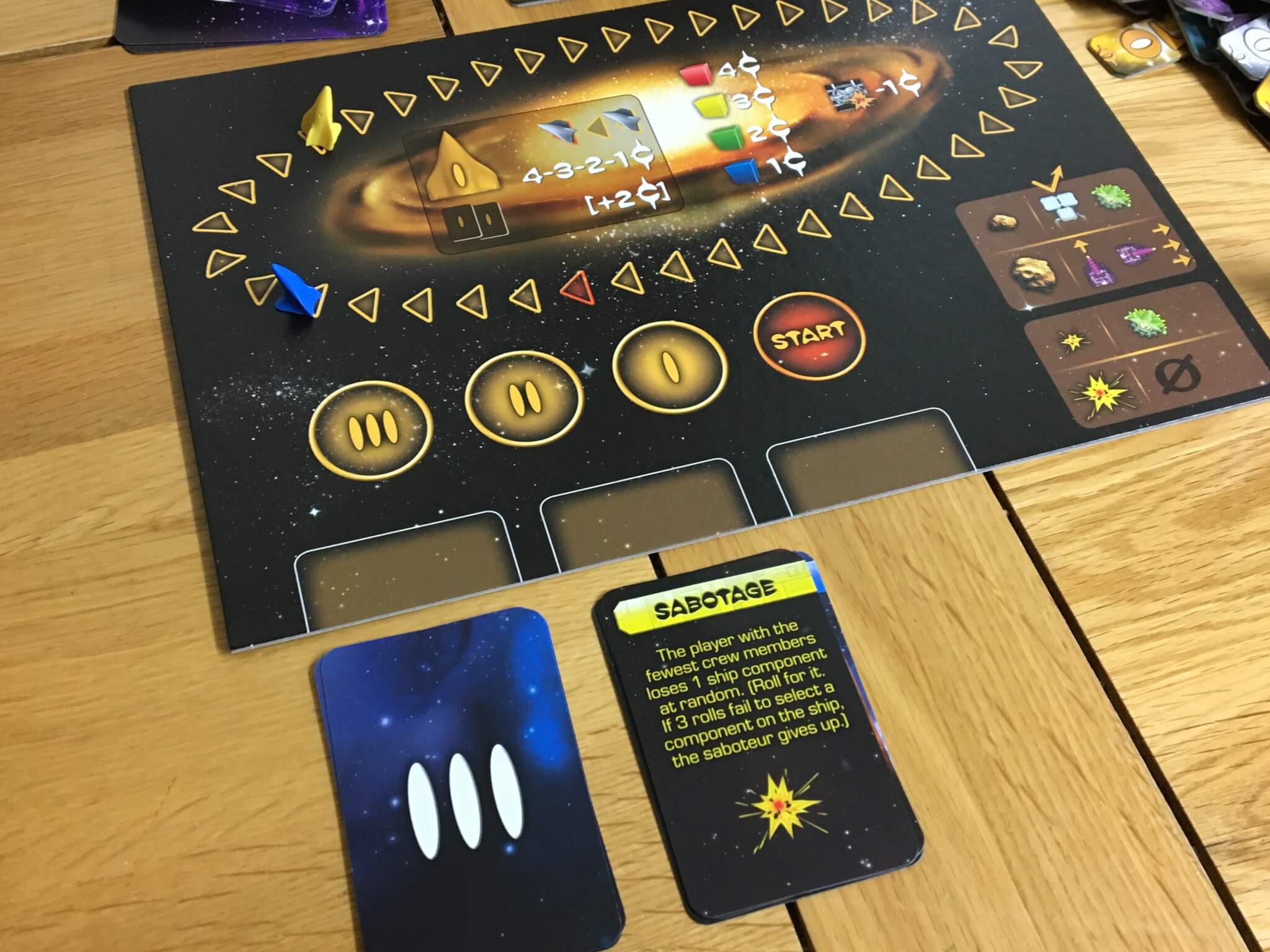
Despite all that, Galaxy Trucker remains something of an enigma. It is easily one of the most stupid, most random and most frustrating games ever made, yet at the same time, it’s one of the most comedic and enjoyable. An evening of Galaxy Trucker can fly by in what feels like half an hour, and it’s rare that even the losing player(s) feel as though they were screwed over — even though they probably were.
Played in two phases, Galaxy Trucker has a storyline and sense of humour that is very closely aligned to a low budget BBC comedy. I’m thinking of Red Dwarf or Hitchhiker’s Guide to the Galaxy specifically, but if you can imagine any show made in the 1990’s with most of the set made from painted bits of cardboard, then you wouldn’t be too far wrong. The first phase involves building your ship, whilst the second involves piloting it through a randomised deck of adventure cards.
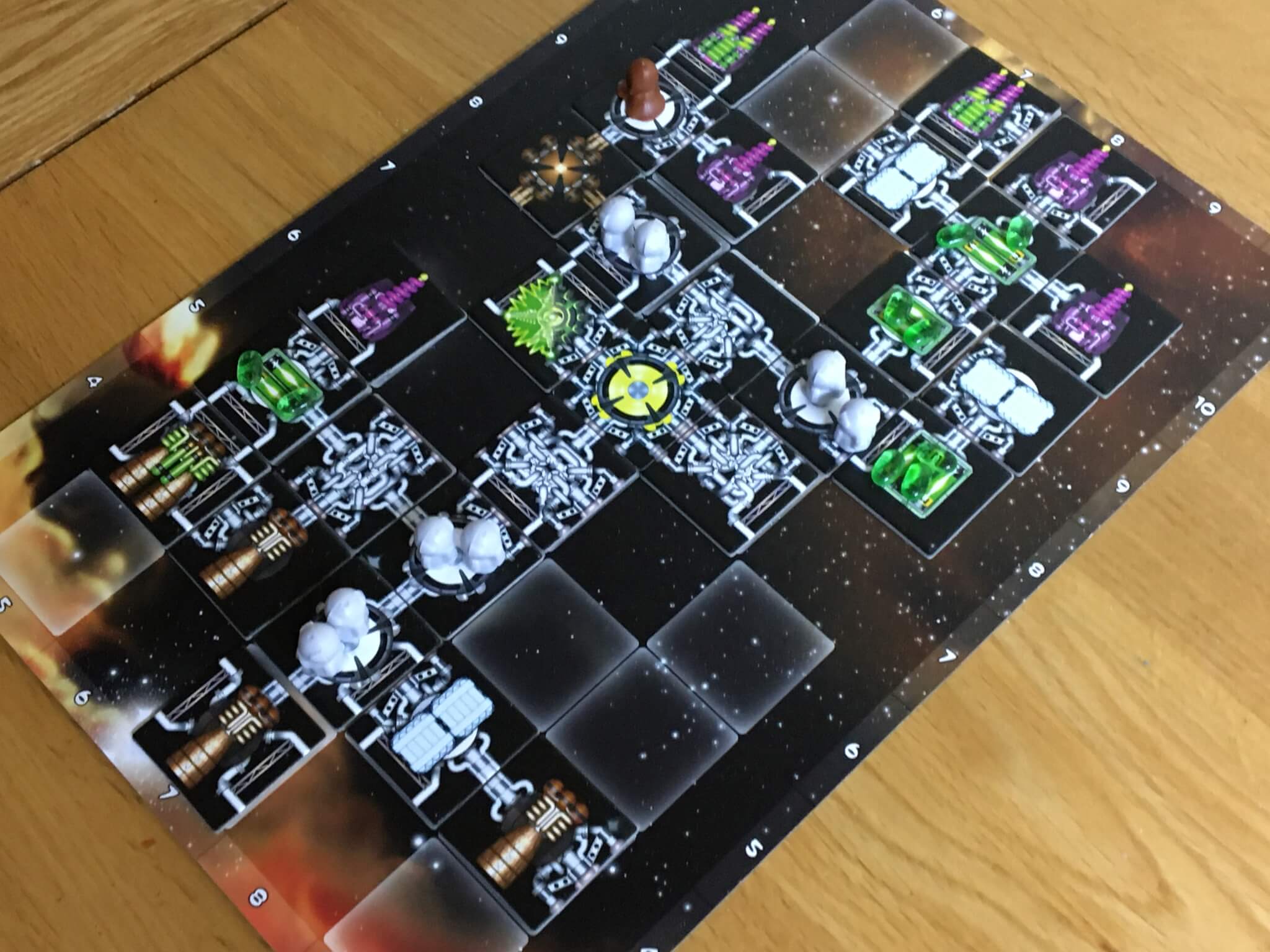
Most of the time when you play Galaxy Trucker, you’ll repeat the build and flight phases three times each, with the ships becoming larger and more complex each round. The base game comes with two double sided player boards for up to four players, with level I, II and III ships, then a special alternate level III ship for advanced players — or even a fourth round. At the end of the final flight phase, the player with the most Space Credits of all will win.
So far, sounds fairly sensible, right? Well, maybe. The ship building element of Galaxy Trucker involves the players working in real time, using one hand to grab pieces from a huge pile that is spread face down on the table. Pieces must be connected to the players ships via single, double or universal connectors, with several other rules also in place for how engines and weapons can be placed for optimal use.
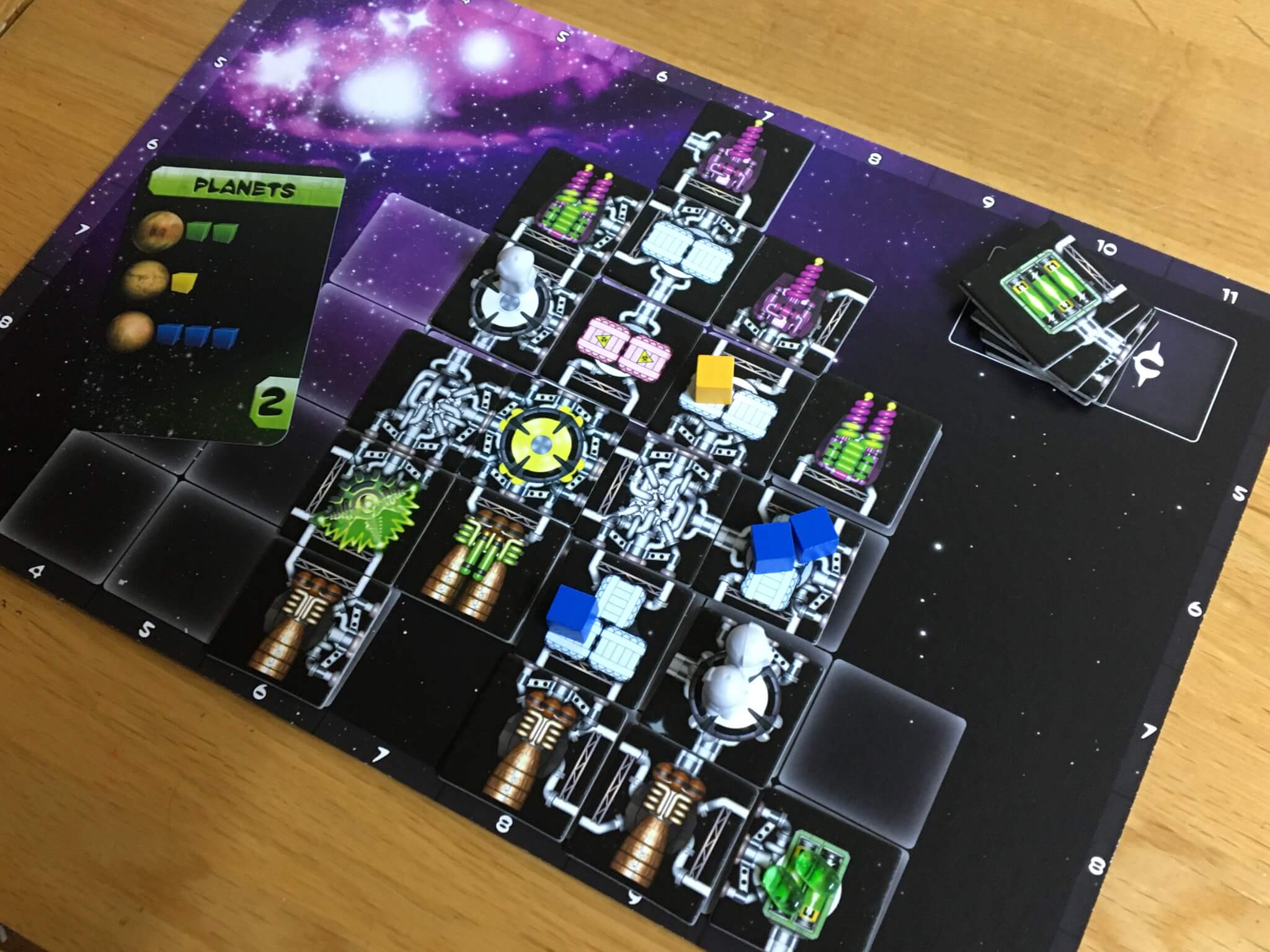
As players grab the pieces and move them onto their ships, they can reserve up to two pieces for later in the build by placing them onto their boards, however should they not use those pieces, a penalty must be paid. Other pieces that are picked up but not used can be placed back on the table face up, but may then be taken by any player. As players complete their ships (with engines, weapons, crew and cargo compartments and more) then they declare themselves finished and take a turn order token. A sand timer can be used during this process to add a further sense of urgency.
At the end of the building phase, the players will each be looking at a ship that will be in a state of relative completion. Maybe you got all the pieces you wanted and things worked out well, or, more commonly, maybe you only have one engine and nowhere near enough batteries to power your array of front mounted twin laser cannons. EIther way, you’ll still have to endure the next phase; flight.
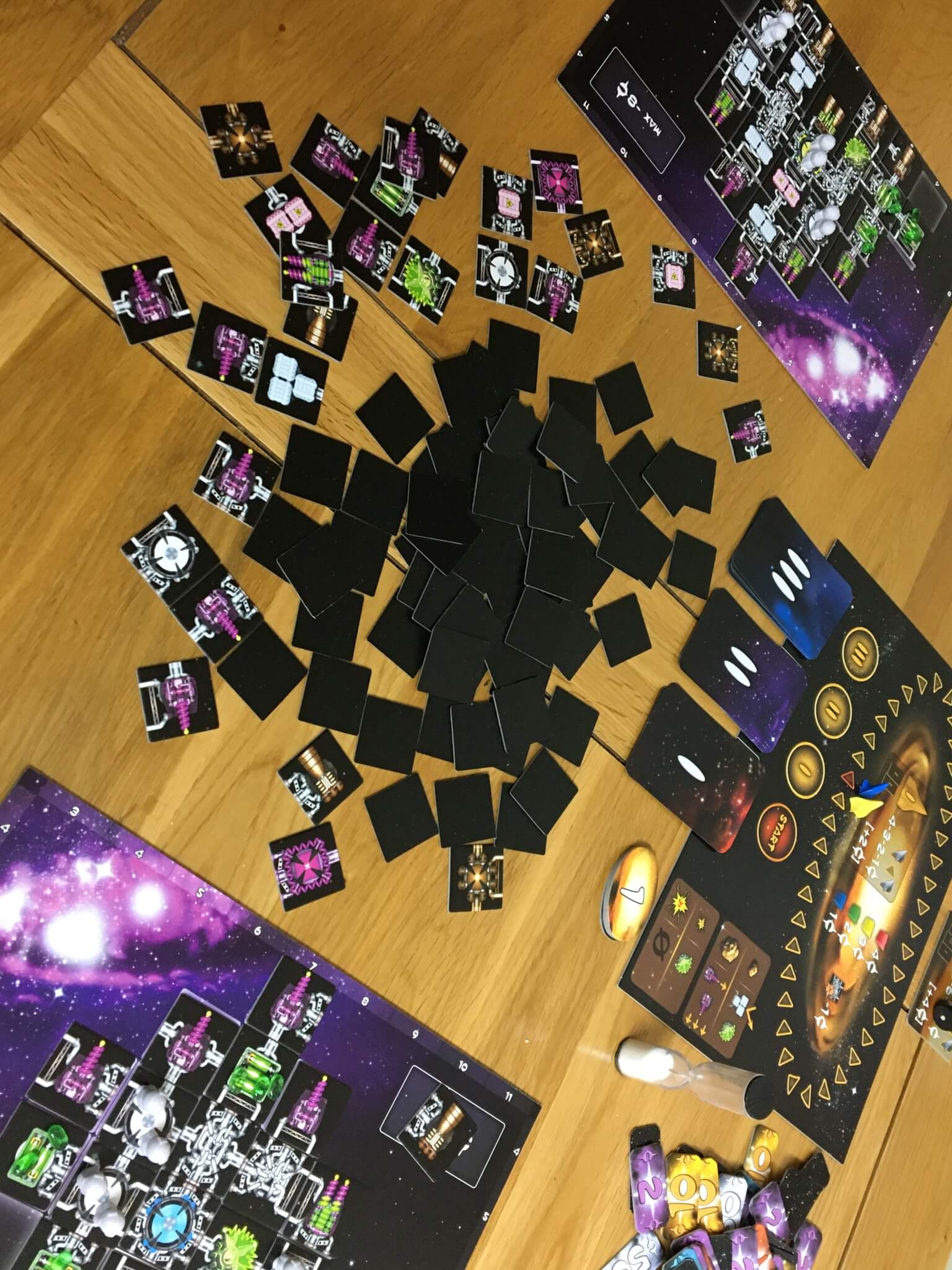
Each flight phase is built around a set number of cards, drawn randomly from the appropriately numbered (I, II, or III) deck, with a pre-agreed number of cards indicating the length of the journey. Classic Galaxy Trucker rounds usually consist of between eight and twelve cards per deck, but you can adjust this number up or down to either increase or decrease the difficulty.
Players then resolve each card based on turn order. The player who took the first player token will have first stab at whatever the first card shows, which might be pirates, meteors, or friendly planets trading cargo. Where the card is a threat like pirates or scavengers, the players may test their weapon strength against the enemy until one player defeats them — if this is the first player then no one else will take any action relating to that card. When such a threat cannot be defeated, it will cause each player to suffer a penalty such as losing crew, or being shot at.

The turn order can change during each flight, with things that slow the first one or more players down being one of the catalysts. For example, stopping to collect cargo or money from a derelict ship might slow a ship down by two, allowing other ships to pass. On other occasions, Open Space cards will allow players with stronger engines to gain speed, whilst those with no engines will simply drop out of the flight and be eliminated from the round.
This all sounds like good clean fun, but that’s not really how it always pans out. The ships that players are piloting are made from repurposed sewer pipes, which makes them very fragile. This is especially true when there are open connectors, and whenever such parts of the ship are hit by meteors or shots, they will be destroyed and cumulative shots can easily shear ships in two. At the end of each flight, players suffer a penalty for each piece of sewer pipe they fail to deliver, often leaving them in debt.

There’s a lot of luck involved in Galaxy Trucker’s gameplay, either due to which pieces are drawn during building, which cards are drawn during flight and the dice rolls associated with shots or meteors hitting the ships. This can mean that a game can swing wildly from a player having an exceptional round to then having a terrible one where they don’t even make it home.
Whilst very random and often very punishing, Galaxy Trucker never fails to raise a smile from those playing it, except on those rare occasions where it’s the same person’s ship that explodes time after time after time, which can occasionally happen. Breaking the game down into smaller sessions — a single flight perhaps can take this out of the equation, but then you do lose the thrill of having a living bank balance that is in jeopardy from one flight to the next. For my gaming group, the potential for frustration means that Galaxy Trucker must be played in moderation so as not to alienate the audience, which is a shame, because I absolutely love it.

Thankfully, around the same time as I was asked to look at Galaxy Trucker, I also learned that CGE has an app version of the game that supports both solo and multiplayer use. The app itself features cute but functional visuals and a well structured campaign mode that breaks the game down into smaller chunks — usually a single build and flight phase punctuated by a passage of story text that is heavy on the humour and light on the need to commit yourself mentally for more than about ten seconds.
A multiplayer mode is also present in the app, offering the base game that players know and love, plus a number of variant options for a shorter or longer game. The app also features one expansion at current, known as Alien Technologies, adding new parts, new alien modules (with various effects) and a load of single player challenges that further enhance the experience, especially for players like me who use the app on an iPad or similar mobile device.

The real killer hook for the Galaxy Trucker app is that I don’t think I’d have got into the original game without it. The tutorial is very streamlined and the various phases of play work beautifully with swipe controls. I also learned that I’d been playing the tabletop version incorrectly — shearing off entire lines of ship parts, rather than just the individual component. Rest assured, Galaxy Trucker is hard enough with only single components snapping away, and my comments on it earlier reflect the correct rules interpretation.
Playing Galaxy Trucker alongside its app equivalent reminded me of several other exceptionally well executed board game apps, not least Lords of Waterdeep, which is still my other favourite digital adaptation. There’s also Raiders of the North Sea and Flash Point which both represent their physical equivalents well enough, but surely none can compete with Gloomhaven, which is worth investing in digitally if only to save yourself the hassle of setting it up and tearing it down each session?
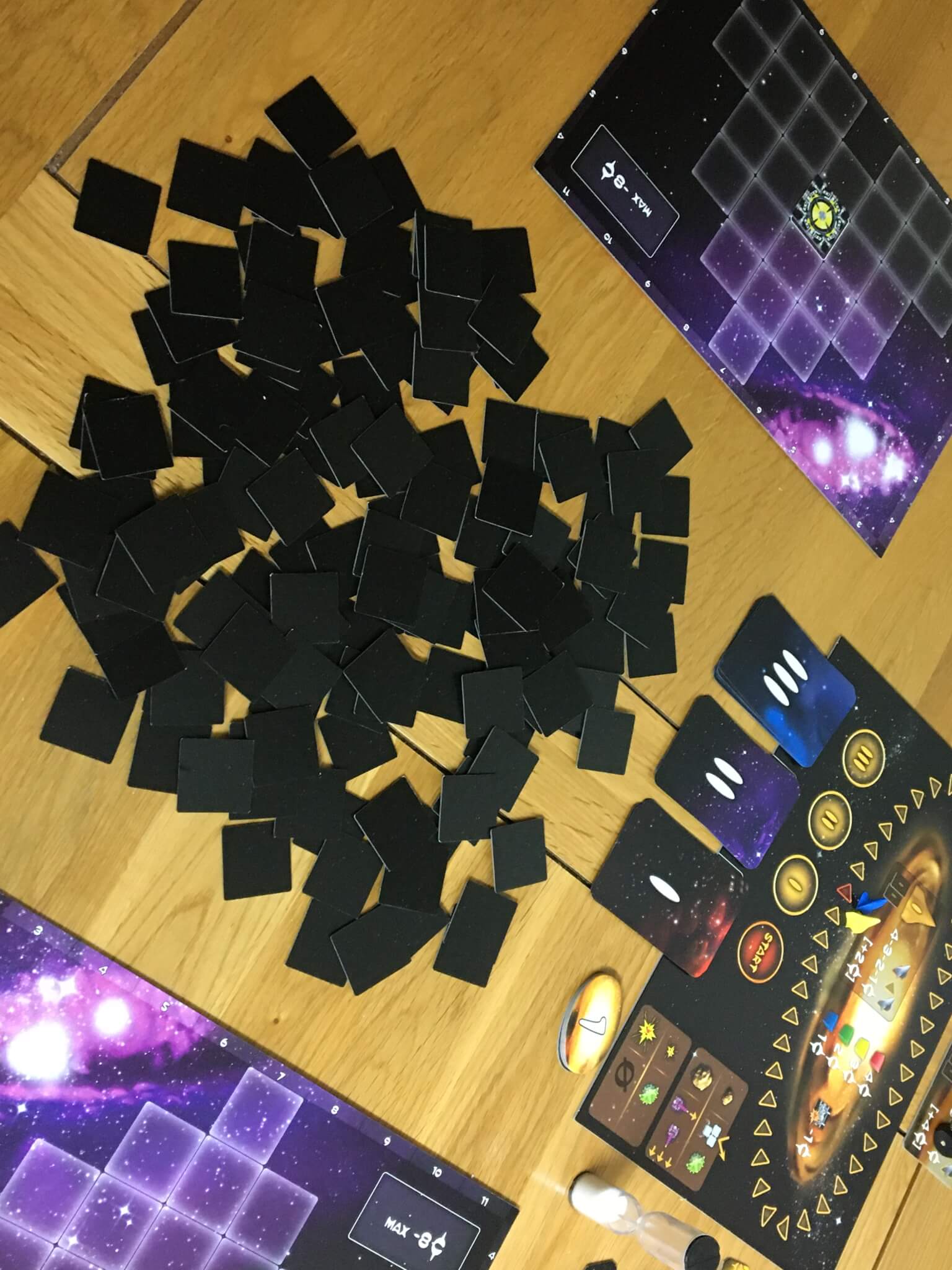
In conclusion, the Galaxy Trucker app reinvigorates a superb game that is over twelve years old, introducing its rules and systems clearly and succinctly. More importantly though, it introduces players who might otherwise have overlooked this classic game to the fun, frantic gameplay and the kind of hijinks that can be expected around the table.
Galaxy Trucker might be based on a lot of luck based mechanisms that have fallen out of favour, but its classic humour and laugh out loud gameplay more than make up for any frustration that might be caused by a lack of control. With several large expansions already in the market, there’s a wealth of content to choose from, but I’d recommend new players begin with the app and then consider adding the basic game to their tabletop collection.
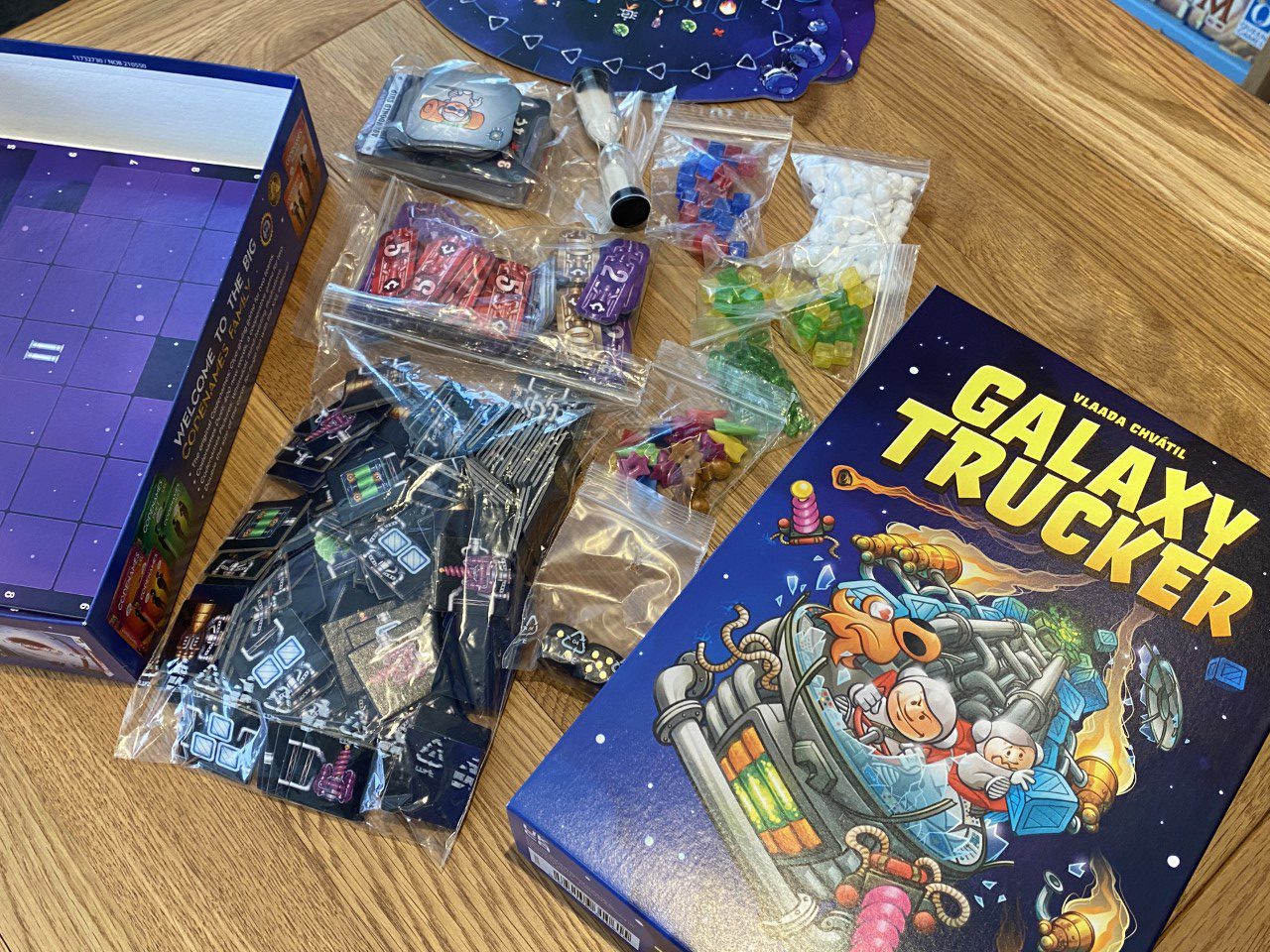
2021 Re-Release
Whilst this is already a massive review, I felt it necessary to come back here and update my review following the release of a “new version” of Galaxy Trucker late in 2021. As you can see in the image above, this new version features subtly different artwork (mainly with respect to the type-font) and a slightly smaller, redesigned box. At present (March 2022) only the base game is available, and none of the expansions that were released for the original game have been announced yet.
Delving deeper into the new version of Galaxy Trucker (which is still just called Galaxy Trucker, by the way – not Second Edition or anything) and we see a few more changes. The ship component tiles are slightly smaller, the ship boards are now double-sided and fold out (to save space) whilst the flight boards are printed individually and have differing numbers of spaces – which means a player can more easily be lapped (and therefore eliminated.)
Otherwise though, the changes in this edition of Galaxy Trucker are purely visual, and have little or no impact on gameplay. I would argue that the new box is slightly better looking, but that is somewhat subjective, of course. Whether you prefer it or not, the new version of Galaxy Trucker is what will now ship as standard, so unless you seek out a second hand copy, this is the one you’ll get. Galaxy Trucker remains one of the most unique and interesting board game experiences out there.
You can purchase Galaxy Trucker on Amazon.

Comments are closed.